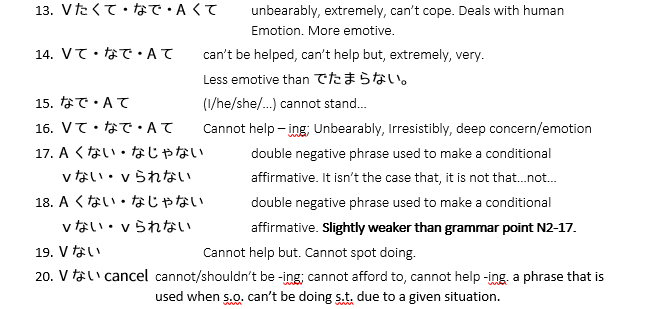Well your sensei is not wrong in that most of the shit you'll learn up to 1 you'll probably never see or use because there is always a more casual/simpler way to say it. That video is actually a good example as it has a lot of those kinds of grammar. But it doesn't mean you won't run into it, it just means you probably won't run into it the way you studied it for a test.
As a foreigner, you will most likely revert to the simplest thing in your mind to express yourself. You probably won't reach for advanced grammar points because you feel safer using the easier ones, and the easier ones still get the point across. Advanced grammar points really come when you want to add nuance, right?
The stuff you pick up there are more mannerisms and colloquial ways of expressing common ideas. I think a good example of this, and other people who work in Japan can back me up, is the way most people use some variation of te itadaketara/itadakereba (ii na to omou) which is not anything you will pick up in a book. But literally everyone says it. But you'll never see it in a show. But literally everyone says it. So why wouldn't you?
To your point with nai koto ha nai, I use it plenty, just not always in book ways. Think about it like this.. you're at a bar with some guy and you're talking about whatever and he says do you like xxx do you do xxx are you into xxx..
You could reply with 'hai' or 'iie' and some kind of 'suki desu' or 'iya desu' or whatever the fuck.. and you'd answer his question. Or you could bite your teeth, suck air in, and say 'maaa nai koto ha nai kedo.....' and you've expressed something in the middle of yes/no that you can then expand on.
Once you're working on N2 grammar, and especially N1, there's a lot of stuff that is completely nonessential. You move on from what we'd consider basic grammar, and into rhetoric and how to make lively conversation instead of just conveying information. Native speakers use this stuff every day, and thus it is essential grammar, but, as a language learner, learning to use these new patterns is far less important than learning to understand them. If you're still having trouble using all the N5-N3 grammar in light conversation, trying to grasp small differences between two nearly identical phrases of protest is absolutely unimportant, compared to other things that are far more useful and everyday.
Imagine that you have a friend, and just yesterday he said "Coach made 30 pushups do me." instead of "My coach made me do 30 pushups." Today he comes up and asks you "what's the difference between "I wouldn't mind having breakfast at 8" and "I wouldn't object to having breakfast at 8"" You'd probably tell him that it's not important and he's probably not going to need to use it, so if he understands what it means it's totally okay.
This is also one of the admitted gaps in "the whiteboard method." I don't want to call it a shortcoming, because there's not any other method that magically makes this stuff easy and fast. Learning to understand all of this stuff and use it naturally takes time and exposure. You're setting the foundations by learning about it, and doing so in a remarkably short time frame compared to other people who study in a college class or work at a somewhat more leisurely pace (like myself), but natural use of this sort of rhetoric will take a lot more time.
thanks. as I move past the simple terms that help me express my self in a round way, and in to the trickier/more tedious/difficult stuff, i just like to see how other people who have been exposed to that content for longer treat it.
I will say though that the Whiteboard method can actually be extremely handy for learning the nuances and differences between grammar points/patterns that are similar,
provided you have the right resources and are setting it up correctly. here is an example of my writing list for N2 so far. I use this, and force myself to pull the Grammar from memory using the English trigger. the idea is that when I ever need to do this
or I see it in the wild, I can associate it's meaning with an explanation I have set up.
13.てたまらない。
14.て仕方がない。
15.てかなわない。
16.てならない。
17.ないことはない。
18.ないこともない。
19.ないではいられない。
20.ずにはいられない。
now using this, when I stare at the board I have to just remember what it is using the small cues I've given myself (generally the form of a Verb, noun, adjective etc that precedes it) so that I can just become used to it. It works well, it takes usually 3-4 days for the harder ones to stick, and a day or 2 for the simpler ones.
The triggers are made using either partial explanation from the Japanese Grammar dictionaries (which completely flesh out each point) or the Jgram database, which is handy because it covers the N1 - N4 points in list form. I'm also using a textbook just to make sure I'm not missing anything that may pop up in the test.
So, yeah lol just wanted to say you can actually completely cover the grammar as far as it can go using text resources, if you set it up properly for the whiteboard method. BUT obviously you need to use it and see it in the wild, and in proper conversation to fully understand it's use, and when to use it (which was why I asked lol).

